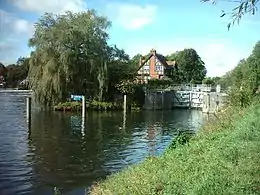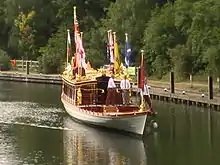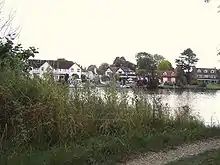Bray Lock
Bray Lock is a lock and weir on the River Thames in England near Bray and Dorney Reach, and is just above the M4 Bridge across the Thames. The lock is on the Buckinghamshire side of the river on the opposite bank from Bray itself and Maidenhead which are in Berkshire. Here, the county line stands roughly halfway between the lock and the opposite bank, following the course of the Thames itself. The pound lock was built by the Thames Navigation Commission relatively late, in 1845. The lock keeper's cottage is on an island (Parting Eyot) between the lock and the weir.
 Bray Lock, Buckinghamshire | |
| Waterway | River Thames |
|---|---|
| County | Buckinghamshire |
| Maintained by | Environment Agency |
| Operation | Hydraulic |
| First built | 1845 |
| Latest built | 1888 |
| Length | 40.94 m (134 ft 4 in)[1] |
| Width | 5.46 m (17 ft 11 in)[1] |
| Fall | 1.46 m (4 ft 9 in)[1] |
| Above sea level | 69' |
| Distance to Teddington Lock | 29 miles |
Bray Lock | ||||||||||||||||||||||||||||||||||||||||||||||||||||||||||||||||||||||||||||||||||||||||||||||||||||||||||||||||||||||||||||||||||||||||||||||||||||||||||||||||||||||||||||||||||||||||||||||||||||||||||||||||||||||||||||||||||||||||||||||||||||||||||||||||||||||||||||||||||||||||||||||||||||||||||||||||||||||||||||||||||||||||||||||||||
|---|---|---|---|---|---|---|---|---|---|---|---|---|---|---|---|---|---|---|---|---|---|---|---|---|---|---|---|---|---|---|---|---|---|---|---|---|---|---|---|---|---|---|---|---|---|---|---|---|---|---|---|---|---|---|---|---|---|---|---|---|---|---|---|---|---|---|---|---|---|---|---|---|---|---|---|---|---|---|---|---|---|---|---|---|---|---|---|---|---|---|---|---|---|---|---|---|---|---|---|---|---|---|---|---|---|---|---|---|---|---|---|---|---|---|---|---|---|---|---|---|---|---|---|---|---|---|---|---|---|---|---|---|---|---|---|---|---|---|---|---|---|---|---|---|---|---|---|---|---|---|---|---|---|---|---|---|---|---|---|---|---|---|---|---|---|---|---|---|---|---|---|---|---|---|---|---|---|---|---|---|---|---|---|---|---|---|---|---|---|---|---|---|---|---|---|---|---|---|---|---|---|---|---|---|---|---|---|---|---|---|---|---|---|---|---|---|---|---|---|---|---|---|---|---|---|---|---|---|---|---|---|---|---|---|---|---|---|---|---|---|---|---|---|---|---|---|---|---|---|---|---|---|---|---|---|---|---|---|---|---|---|---|---|---|---|---|---|---|---|---|---|---|---|---|---|---|---|---|---|---|---|---|---|---|---|---|---|---|---|---|---|---|---|---|---|---|---|---|---|---|---|---|---|---|---|---|---|---|---|---|---|---|---|---|---|---|---|---|---|---|---|---|---|---|---|---|---|---|---|---|---|---|---|---|---|---|---|---|
| ||||||||||||||||||||||||||||||||||||||||||||||||||||||||||||||||||||||||||||||||||||||||||||||||||||||||||||||||||||||||||||||||||||||||||||||||||||||||||||||||||||||||||||||||||||||||||||||||||||||||||||||||||||||||||||||||||||||||||||||||||||||||||||||||||||||||||||||||||||||||||||||||||||||||||||||||||||||||||||||||||||||||||||||||||
The weir is almost level with the lock and runs straight across to the opposite bank from the other side of the lock island.
History

There was a mill recorded on the site in the Domesday book and in 1328 there was a reference to "Richard atte Lock of Bray" occupying a weir called Braibrok.[2] Fifty years later in 1377 there are records of travellers complaining of the excessive tolls at a flash lock on the site called Hameldon Lock.[2] Both the lock and the weirs were removed in 1510 by order of the Commissioner of Sewers.
In 1622 a new flash lock was built by Thomas Manfield[2] and presence of water pens is noted in 1632. Navigation may in earlier times have used York Stream which went on the other side of Bray to Maidenhead. A pound lock and weir were first proposed in 1833 for the "improvement of navigation two or three miles above". The fall between Maidenhead and Boveney was large, leading to shallows and a strong current. The towpath was on the Buckinghamshire bank, and navigation on the Berkshire side, so tow ropes had to pass across the island. The suggestion of a lock was made again in 1843 and a lock house built on Parting Eyot with an open-sided lock the following year. The miller contributed to the cost of the weir. The lock was often left open except when river levels were low and no tolls were collected.[3] Sides were added before 1877 and the lock and weir were rebuilt in 1885.[4] Prior to the rebuilding Charles Dickens had described Bray Lock as a "rotten and dangerous structure".[3]
Incidents
On 2 August 2015, a privately owned cabin cruiser carrying four adults and four children suffered a catastrophic explosion of its propane canisters, caused by the ignition of fuel that had accidentally been poured down a waste pipe. Six of the eight people involved, including a three-year-old boy, were rushed to St. George's Hospital in London and John Radcliffe Hospital in Oxfordshire by Air Ambulance for treatment.[5][6][7] Another man suffered minor injuries, but was treated at the scene. Members of the public, including the Lock keeper, assisted in the efforts, evacuating the injured from the destroyed boat onto a hire craft for triage.
Reach above the lock

Immediately above the lock is Headpile Eyot. Bray is on the Berkshire bank while the Buckinghamshire bank has open fields. Further along the reach is Brunel's Maidenhead Railway Bridge, known as the "Sounding Bridge" from the spectacular echo underneath it. The Maidenhead bank is lined with large Edwardian houses up to Maidenhead Bridge beside which is the Skindles Hotel once a notorious rendez-vous for illicit coupling.[8]
Along the banks of the reach are multiple mansions and boathouses, many of which have been or are owned by high-profile British Celebrities such as Michael Parkinson and Rolf Harris.
Above the bridge are the islands of Bridge Eyot and Grass Eyot before Boulter's Lock with Taplow on the Buckinghamshire side.
Maidenhead Regatta takes place below the railway bridge in August, and is followed by the annual Thames Punting Championships. The Maidenhead Junior regatta is held in May.
Sports clubs
Thames Path
The Thames Path follows the Bucks (Eastern) bank to Maidenhead Bridge, which it crosses, and then proceeds on the Berkshire side to Boulter's Lock.
References
- "Environment Agency Dimensions of locks on the River Thames". web page. Environmental Agency. 8 November 2012. Retrieved 18 November 2012. Dimensions given in metres
- Over, Luke (1993). The Royal Hundred of Bray. Tyrrell, Chris (Illustrations). Cliveden Press. ISBN 0-9521969-0-5.
- Kemplay, John (2000). The Thames Locks. Ronald Crowhurst. ISBN 0-9518964-1-5.
- Fred. S. Thacker The Thames Highway: Volume II Locks and Weirs 1920 – republished 1968 David & Charles
- Raven, David (2 August 2015). "Six in hospital after boat explosion on River Thames". mirror.
- "Seven injured in boat explosion". BBC. 2 August 2015.
- Paul Goldsack, River Thames: In the Footsteps of the Famous, English Heritage/Bradt, 2003.
| Next lock upstream | River Thames | Next lock downstream |
| Boulter's Lock 3.43 km (2.13 mi)[1] |
Bray Lock Grid reference: SU909797 |
Boveney Lock 5.10 km (3.17 mi)[1] |
- "Environment Agency Distances between locks on the River Thames". web page. Environmental Agency. 19 November 2012. Retrieved 21 November 2012. Distances given in km